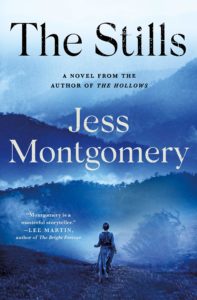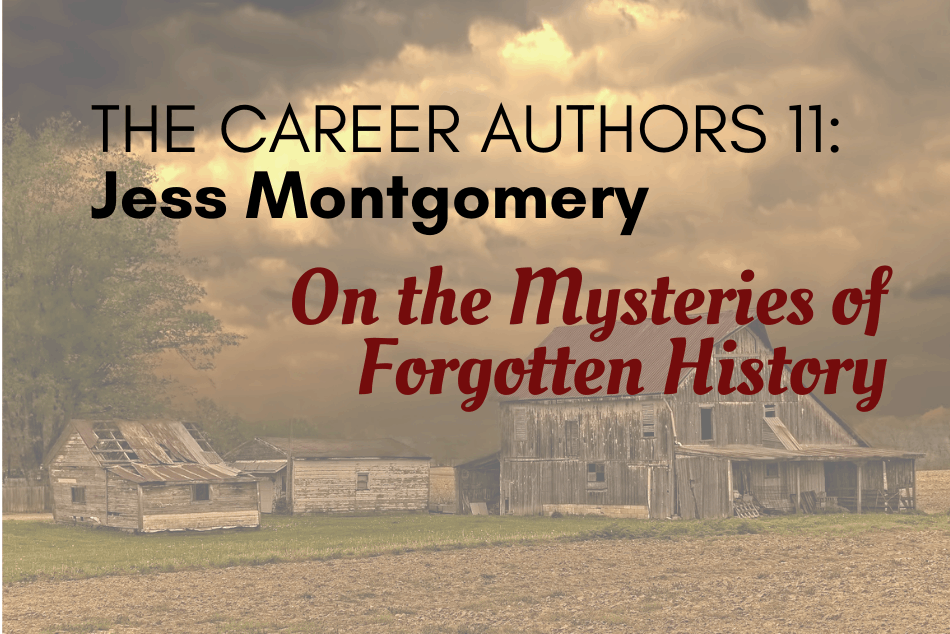Years ago, mystery writer Jess Montgomery stumbled upon an incredible, little-known character from Midwestern history: Ohio’s first female sheriff (one of the first in the entire country), who stepped into the job when her husband was killed in the line of duty. Thus, the Kinship Series was born, stories driven by strong, resourceful, resilient women that transport readers to the Appalachian hills—1920s small town life and the farms, mines, and—yes—murders that went along with it.
The Widows introduced these unforgettable women, The Hollows put them to the test, and on March 9, The Stills takes us into the backwoods of Prohibition. We challenged Jess Montgomery with the Career Authors 11 to tell us how she does it.
-
What book changed your life?
Mystery on Hopkins Island (originally titled Turn Around Twice) by Elisabeth Ogilvie. My Grandma Lou gave me this book when I was 12 or so. She worked at a charity shop in her small town in eastern Kentucky, and a somewhat tattered copy of the book came in one day. She mailed it to me—just because. (It wasn’t a holiday or my birthday!) I like to think Grandma Lou, who was well aware by then of my love of reading and writing, read the book’s description and knew I’d love it.
The novel is about a 16-year-old writer who wins a writing contest, and has a choice for her award—$3,000 or a tiny island off the coast of Maine. She, of course, chooses the island. Then she convinces her parents to let her take herself and her younger siblings to visit the island where she soon finds a mystery to solve AND romance with a lobsterman (he is all of 17).
At that point in my life, I had only travelled from my home in Ohio to visit Grandma in Kentucky, so this novel set in Maine was so exotic to me. And the notion of writing and being rewarded for it (with, perhaps, an entire island!) was inspiring. Throw in mystery and romance, and I was hooked. I think that novel, besides giving me goals, established my love of mystery stories.
-
Was your first published book the first manuscript you ever wrote?
Definitely not! Let’s see—I wrote two complete manuscripts, and one partial manuscript, plus numerous short stories, before my first novel was accepted for publication.
-
Stephen King says, “The hardest part is just before you start.” What’s the hardest part of writing for you?
That first draft! I love brainstorming and planning. I love revision, even major revision, and fine tuning. Creating a raw draft, though, is a true slog for me.
-
Do you know the story’s ending before you start?
Well, I have to think I know the ending. Usually, the actual ending comes pretty close to the planned ending, though almost always I discover some twists I hadn’t planned for. With my most recent novel, I wrote the epilogue well before most of the rest of the novel. That gave me something to write toward.
-
When you’re having a difficult writing day, what do you tell yourself to get through it?
I tell myself to write just one, crappy sentence. Then I tell myself to write just one more, crappy sentence. Eventually, I’m writing crappy sentences without having to tell myself to do so. (And the lovely thing about writing lots of crappy sentences? Eventually you have crappy paragraphs and pages to revise!)
-
Do you read your reviews?
Unfortunately, yes. Sometimes, the good ones go to my head. But only temporarily, because then I’ll read a not-so-kind one and feel deflated. (Sometimes, the not-so-kind ones are so vicious that they just make me laugh, honestly.) I remind myself that not everyone will find my work to their reading taste—and that is fine. I do like to read reviews to find what seems to resonate positively for most readers of my work (and what seems to fall flat for more than one).
I’m constantly trying to improve as a writer, and reading thoughtful reviews can help with that.
But at the end of the day, it’s really up to me to create the most satisfying tale that I can, and then trust my team—my agent, my editor and sometimes trusted readers—to help me improve it before publication.
-
Besides being persistent and correcting spelling errors, what’s your best advice for a new author?
Become part of a trusted community of fellow writers. That doesn’t necessarily mean a critique group. (Critique groups don’t actually work for me.) But have a half-dozen or so trusted writer friends who you can empathize with about the writing life. Sometimes, that can mean getting or giving feedback but more often, for me, it means knowing I have trusted writer friends who get it—truly get it—if I need to say, “Wow, this is hard!”Or ask for advice or just a sanity check. Simply knowing that net exists means the world to me.
-
What’s your definition of writer misery?
Falling down a spiral of self-doubt, spurred by a swirl of questions: Will I ever finish this book? Does this book make sense? Why did I think I could do this? Such misery is made even worse if compounded by the compare game, which for me always means finding myself coming up short in comparison to other writers’ careers. (Playing the compare game and finding oneself coming up “better” in comparison to other writers’ careers seems even unhealthier.)
All of the above is only human, but it is also, ultimately, a waste of energy, and is unworthy of our time. To break myself out, I remind myself that my job is to Serve The Story. For me, that means crafting the best story I can, not short-changing steps, such as truly delving into character motivation, to save time or because this is hard work. When I commit to Serving The Story, as a creative but also spiritual practice, I pull myself (and my ego) out of the self-doubt spiral.
-
What’s your definition of writer happiness?
When I am truly Serving The Story, I get lost in the process of writing. Another way to put it might be, I get in “the flow.” When I come back to myself and my surroundings, I feel at peace in a Zen-like way. I also love when my characters come to life for me. I think of many of the characters in my Kinship series as very real people, and worry and wonder about them even when I’m not writing about them.
-
What’s your favorite book on writing?
It’s so difficult to pick just one! But I’ll go with Beginnings, Middles & Ends by Nancy Kress. The premise of this craft book is that every writer has a weak spot—either in beginning a story, pulling it through the middle, or finding a dynamic ending. Kress helps writers diagnose why, and offers up practical tips for curing the problem.
-
What book are you reading right now?
The Lying Game by Ruth Ware. I’m a big fan of Ware’s novels. I started with her more recent One by One, and know I will read everything she’s written (or will write.) I love how she peels back more layers, reveals more information, only to generate even more story questions! So deliciously good.

 Jess Montgomery is the “Literary Life” columnist for the Dayton Daily News and writes a new Writer’s Digest column, “Level Up Your Writing (Life).” Based on early chapters of the first in the Kinship Series, The Widows, Jess was awarded an Ohio Arts Council individual artist’s grant for literary arts and named the John E. Nance Writer-in-Residence at Thurber House in Columbus. She lives in her native state of Ohio. Reach Jess via her website, www.jessmontgomeryauthor.com or on Facebook @JessMontgomeryAuthor.
Jess Montgomery is the “Literary Life” columnist for the Dayton Daily News and writes a new Writer’s Digest column, “Level Up Your Writing (Life).” Based on early chapters of the first in the Kinship Series, The Widows, Jess was awarded an Ohio Arts Council individual artist’s grant for literary arts and named the John E. Nance Writer-in-Residence at Thurber House in Columbus. She lives in her native state of Ohio. Reach Jess via her website, www.jessmontgomeryauthor.com or on Facebook @JessMontgomeryAuthor.





